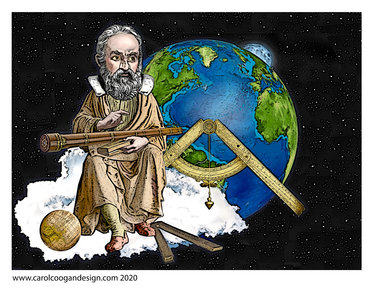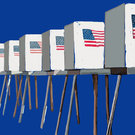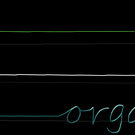The Scientific Integrity Act – too late to help Galileo, but maybe not too late to help us
“Let science rule. Make sure everyone works in tandem,” said Congressman Paul Tonko who represents the Capital Region. He spoke those wise words during a video call at an Albany County press conference last month.
The current administration has had little regard for science, ignoring facts or bending them to fit its purpose with the misguided notion it benefits the American people.
We were pleased the House of Representatives passed The Heroes Act last week. Federal money is badly needed to replenish the drained state and local government coffers as those governments fight the coronavirus pandemic. Because of the shutdown economy, tax revenues are gutted while at the same time the costs for testing, tracing, and treating patients to contain the disease have skyrocketed.
We realize passage of The Heroes Act faces an uphill battle in the Senate as some Republicans have wrongly framed this as a political battle — red states versus blue states — at a time when Americans should be working together to contain the virus.
The part of the act that thrills us, though, has more far-reaching consequences than the current pandemic — it could help prevent future pandemics as well as help us as a society to move forward on environment fronts to preserve life on Earth.
That part is the Scientific Integrity Act. Congressman Tonko started work on this legislation four years ago and gained bipartisan support for it from Republican cosponsors when it was passed by the full House Committee on Science, Space and Technology.
Now is a time — as we’ve seen with false information coming from the White House — that public science and scientists need to be insulated from political meddling and retaliation. It is crucial in the midst of the pandemic that the public be accurately informed.
“Science and the scientific process should help inform and guide public policy decisions on a wide range of issues, including improvement of public health, protection of the environment, and protection of national security,” says the act.
“The public must be able to trust the science and scientific process informing public policy decisions,” it goes on. “Science, the scientific process, and the communication of science should be free from politics, ideology, and financial conflicts of interest … policies and procedures that ensure the integrity of the conduct and communication of publicly-funded science are critical to ensuring public trust.”
The act ensures that the federal agencies funding, conducting, or overseeing research should not suppress, alter, interfere with, or otherwise impede the timely communication and open exchange of data and findings to other agencies, policymakers, and the public.
A year ago, a landmark United Nations report warned that one million species are at risk for extinction and made clear that little time is left to safeguard the biodiversity of a healthy planet.
Humans have altered more than 75 percent of land on Earth and 66 percent of oceans have suffered from human impacts with more than 400 dead zones where little life can survive.
Species are declining, the report found, because of climate change, pollution, overfishing, deforestation, development, and poaching — all human activities. Humans have food, clean water, air, and energy because of the variety of species with which we share the planet.
The Intergovernmental Science-Policy Platform on Biodiversity and Ecosystem Services (IPBES), based in Germany, an independent intergovernmental organization established to improve the interface between science and policy on issues of biodiversity and ecosystem services, has found that, to safeguard the health of the planet, society needs to shift from a sole focus on chasing economic growth. That means nations need to start to base their economies on an understanding that nature is the foundation for development.
Working from results of approved IPBES Assessment Reports, Professors Josef Settele, Sandra Díaz, and Eduardo Brondizio and Dr. Peter Daszak conclude that COVID-19 stimulus measures must save lives, protect livelihoods, and safeguard nature to reduce the risk of future pandemics.
“As with the climate and biodiversity crises, recent pandemics are a direct consequence of human activity — particularly our global financial and economic systems, based on a limited paradigm that prizes economic growth at any cost,” they write. “We have a small window of opportunity, in overcoming the challenges of the current crisis, to avoid sowing the seeds of future ones.”
Diseases like COVID-19, the authors explain, are caused by microorganisms that infect our bodies — with more than 70 percent of all emerging diseases affecting people having originated in wildlife and domesticated animals. Pandemics, however, are caused by activities that bring increasing numbers of people into direct contact and often conflict with the animals that carry these pathogens.
Although animal-to-human diseases already cause an estimated 700,000 deaths each year, the potential for future pandemics is vast. “As many as 1.7 million unidentified viruses of the type known to infect people are believed to still exist in mammals and water birds. Any one of these could be the next ‘Disease X’ — potentially even more disruptive and lethal than COVID-19,” they write.
The solution? They advocate stimulus packages that offer incentives for more sustainable and nature-positive activities, and properly funding health systems to incentivise behavior change on the frontlines of pandemic risk — offering viable and sustainable alternatives to high-risk economic activities and protecting the health of the most vulnerable.
“This is not simple altruism — it is vital investment in the interests of all to prevent future global outbreaks,” they write.
They make a convincing case for adopting a “One Health” approach at all levels of decision-making — from the global to the most local — recognizing the complex interconnections among the health of people, animals, plants, and our shared environment.
In our country, the Centers for Disease Control and Prevention describes One Health this way: “One Health is an approach that recognizes that the health of people is closely connected to the health of animals and our shared environment.”
The CDC provides a long list of zoonotic diseases, spread between people and animals, including rabies, Salmonella infection, West Nile virus infection, Q Fever (Coxiella burnetii), anthrax, Brucellosis, Lyme disease, ringworm, and Ebola.
“Even the fields of chronic disease, mental health, injury, occupational health, and noncommunicable diseases can benefit from a One Health approach involving collaboration across disciplines and sectors,” says the CDC.
So, yes, we need to work together as members of one nation — no red state or blue states, no Democrats or Republicans — but Ameriancs united in fighting this pandemic and healing afterward.
We can use this crisis to earmark funds — locally and nationally — that will restart our economy but in a new and better way, in a way that is respectful of our environment. Our future health depends on it.
Because we are also members of the planet Earth at large, we need to commit to One Health for all.
When Congressman Tonko spoke at the county press briefing, he called for government to be led by science. We’ll end where we began with his important words: “Let science rule.”


